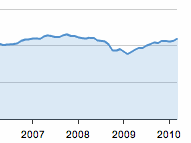I used to think those who were able to retire ten years ago had it made, everything seemed 'easy'. Fuel prices were low (we RV), housing prices were going up & up, seemed any and every investment 'paid off', etc.
However, the last ten years have not been exactly 'pretty', and now I wonder how those that did retire ten years ago got any sleep.
Now I'm in the position to retire soon, and after taking a hard look at conditions today and what might be ahead, the idea of retiring seems daunting......perhaps even VERY daunting.
There are so many moving parts. Thought I'd see what my 'financial advisor' suggested the other day. He would have me put all the lum sum pension (rolled over to IRA) in taxable bonds and the 401k (also rolled over) in utility stock. I thought to myself, if this were ten years ago, that may be good advice......but today? I don't think so.
The stock market seems like Vegas to me anymore. The bond market seems ready to implode. CD's are dead players, etc. But putting it (retirement) off seems to have its own risks, the Pension Protection Act, entitlement reform, the cost of trying to enjoy retirement going up, etc.
So I guess my question is, where do you buy a cast iron stomach, since you must surely need one to retire.
However, the last ten years have not been exactly 'pretty', and now I wonder how those that did retire ten years ago got any sleep.
Now I'm in the position to retire soon, and after taking a hard look at conditions today and what might be ahead, the idea of retiring seems daunting......perhaps even VERY daunting.
There are so many moving parts. Thought I'd see what my 'financial advisor' suggested the other day. He would have me put all the lum sum pension (rolled over to IRA) in taxable bonds and the 401k (also rolled over) in utility stock. I thought to myself, if this were ten years ago, that may be good advice......but today? I don't think so.
The stock market seems like Vegas to me anymore. The bond market seems ready to implode. CD's are dead players, etc. But putting it (retirement) off seems to have its own risks, the Pension Protection Act, entitlement reform, the cost of trying to enjoy retirement going up, etc.
So I guess my question is, where do you buy a cast iron stomach, since you must surely need one to retire.

 ...
...





